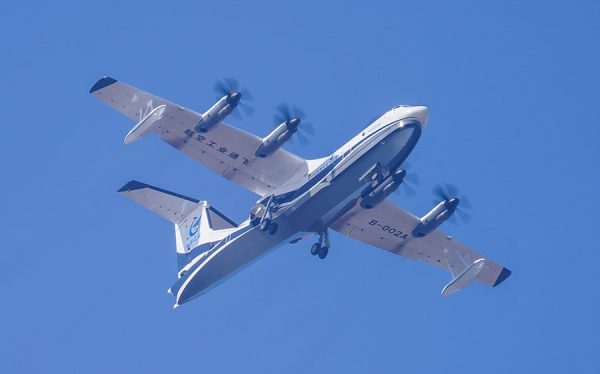
Engineers prepare massive AG600 for takeoff, landing at reservoir
The world’s largest amphibious aircraft, China’s AG600, is scheduled for its first water takeoff and landing in the second half of this year, according to Aviation Industry Corp of China.
The aircraft made its maiden flight in late December, taking off and landing at an airport in Zhuhai, Guangdong province. It has now undergone three test flights using conventional runways.
Test flights will continue in Zhuhai, after which the aircraft will fly to Jingmen, Hubei province, where its research and development was launched at AVIC’s Special Aircraft Research Institute. It will be made ready for its first water takeoff and landing at Zhanghe Reservoir, according to Zhou Guoqiang, spokesman for the State-owned aircraft giant.
Before the water tests, the AG600 will undergo watertight tests and cruise on the lake’s surface at various speeds to verify its capabilities, Zhou said on Monday.
Zhang Jinhua, a deputy to the 13th National People’s Congress who works at the institute, previously told Hubei TV that the first water takeoff and landing will take place in the fourth quarter of this year.
Development of the AG600 was approved by the central government in June 2009. Construction of the prototype began in March 2014 and was completed in July 2016.
The amphibious plane is one of three large-size aircraft to emerge from the nation’s ambitious effort to become a top-tier player in the global aviation sector, joining the Y-20 strategic transport plane-delivery of which began in July 2016 to the Chinese Air Force-and the C919 narrow-body jetliner, which is being flight-tested.
The AG600 will mainly be tasked with performing aerial firefighting and maritime search and rescue. It can also be refitted to conduct marine environmental inspections, marine resource surveys, and personnel and supply transportation, according to AVIC.
Powered by four domestically designed WJ-6 turboprop engines, the AG600 is roughly the size of a Boeing 737. It has a maximum takeoff weight of 53.5 metric tons. These specifications make it the world’s largest amphibious aircraft, surpassing Japan’s ShinMaywa US-2 and Russia’s Beriev Be-200.
The aircraft is designed for both land and water takeoffs and landings and has an operational range of more than 4,000 kilometers. It is capable of carrying 50 people during a maritime search and rescue mission.
When assigned to fight forest fires, it can collect 12 tons of water from a lake or sea in 20 seconds and then use the water to douse blazes over an area of about 4,000 square meters, according to AVIC.


